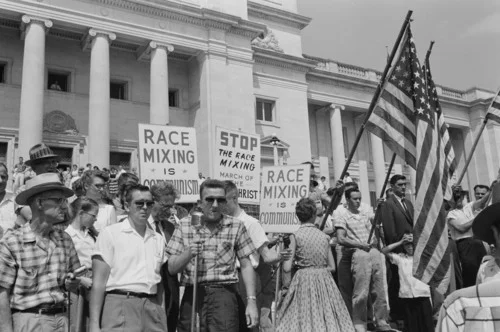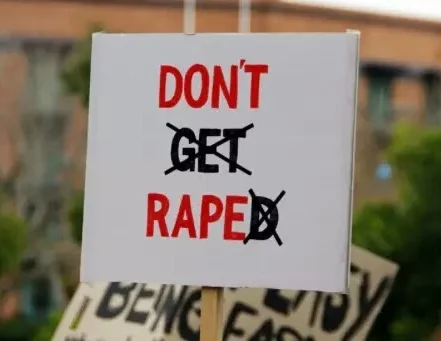Oklahoma University and the Free Speech Battle of the decade.
Published in Jurist
“You can hang them from a tree, but they’ll never sign with me, there will never be a N***** in SAE.” This infamous chant, performed by members of the Oklahoma University (“OU”) chapter of Sigma Alpha Epsilon fraternity (“SAE”), emboldened the nation to further discuss tense race relations in America. Overlooked in these conversations of race are the implications of speech rights on college campuses. In response to the relentless tidal wave of negative publicity sustained by OU, President David Boren denounced the chapter by immediately disbanding the fraternity and expelling two members intricately involved. Were the speech rights of those fraternity members infringed or was Boren justified while acting in his capacity as university president?
The Free Speech clause of the first amendment to the U.S. Constitution provides great latitude for expression. No provision exists to restrict racist, unpatriotic, nor misogynist speech. These forms and several others are surely distasteful to many. But that distaste does not suffice for government imposed prohibition as the U.S. Supreme Court has consistently protected free expression. Boren authored a concise but scathing repudiation of the fraternity after a video surfaced depicting SAE members exercising a particularly heinous form of racist speech. In the words of Boren:
“You are disgraceful. You have violated all that we stand for. You should not have the privilege of calling yourselves “Sooners.” Real Sooners are not racist. Real Sooners are not bigots.”
Boren went on to sever ties with the fraternity and directed the closing of their house. This decision may have run afoul of established free speech rights. Boren sparked an important debate between protecting fundamental rights versus the imposition of government censorship.
Evidenced in the Supreme Court’s 1989 Texas v. Johnson decision, merely “taking offense to certain ideas or expression does not justify prohibition.” In Johnson, the court reasoned that although government officials and military veterans may take considerable offense to the destruction of the American flag, citizens are free to do so in an act of political speech. Essential to the foundation of American independence is the ability for citizens to “petition their government for redress of grievances.” Expression of political speech is inherent in the public display of government disapproval. Thus, the Court was apt to overturn the conviction of Gregory Lee Johnson for publically burning the American flag in Dallas during the Republican National Convention, and to condemn the Texas authorities for denying his rights to political speech.
Prior to Johnson, in 1968 the Supreme Court similarly preserved speech rights on public school campuses. Tinker v. Des Moines marked a shift in the ideology of protections afforded school children. There, the Court recognized the importance of retaining speech rights while on campus. Christopher Eckhardt along with John and Mary Beth Tinker wore black armbands to school in opposition to the Vietnam War. An act of silent protest generally ignored and unnoticed until the district suspended them indefinitely. The Court reasoned, that it is inconceivable “to argue that [s]tudents shed their constitutional rights to freedom of speech or expression at the schoolhouse gate.” This decision opened the door for political and symbolic speech to appear on public school campuses without fear of retribution. According to Tinker, schools may only restrict student speech when it “materially and substantially interferes with the requirements of appropriate discipline in the operation of the school.”
Nonetheless ideals derived in Tinker have contemporary applicability. Institutions of higher education have a “compelling interest in regulating speech that interferes with or disrupts the work and discipline of the school.” The test in Tinker is clear. Speech causing a “material and substantial disruption” is devoid of constitutional protection. Wearing black armbands is clearly not disrupting the learning process. In Norman, Oklahoma, the cynically proud chanting of SAE fraternity members boasting their racially discriminatory recruiting practices may not receive equal constitutional protection that the children in Tinker once enjoyed. Recall the speech in Oklahoma: “They’ll never sign with me, there will never be a N***** in SAE.”
Can we infer from Tinker that schools are limited in their ability to restrict speech? Yes, the burden for speech restriction on the campus of public schools was effectively heightened. Even so, schools remain in authority to restrict speech at their institutions. High school senior Matthew Fraser was suspended in 1986 after delivering a speech laden with unmistakable sexual innuendo to the student body. Ruling against Fraser, the Court in Bethel School District v. Fraserdecided his suspension met constitutional muster. Tempering false expectations of broad speech rights, the Court explained that, “the constitutional rights of students in public schools are not automatically coextensive with the rights of adults in other settings.”
To be clear, the Constitution never intended for students to have Johnson like speech protection rights. There is no correlation of the protected political speech in Tinker or Johnson and the inflammatory racist speech of the SAE fraternity members at OU. The notion that Americans possess an unbridled right to speak freely does not dovetail with reality. Our constitution, though concise and vague has been routinely interpreted as providing limited rights to speech and allows reasonable government regulation. Thus, the actions of President David Boren were prudent under the circumstances.
His position as chief education administrator on the OU campus necessitated the swift and targeted admonition of the hateful speech in question. Had Boren remained silent on the matter, his administration would be viewed as complicit and ultimately as an apathetic instigating force. Consensus denunciation of the extremely vindictive, discriminatory practice being celebrated by the SAE members made Boren’s decision uncomplicated. As the recording spread nationwide in a matter of hours, it was obvious that OU faced dangerous ramifications with inaction. Disbanding this fraternity was essential to OU preserving its educational environment. Comfort knowing that biological composition will not result in discrimination has served as a pillar of public education since the Brown v. Board of Education decision.
Once Boren learned that his institution was a nexus of race-based discrimination, the Equal Protection clause of the Fourteenth Amendment required his intervention. President Eisenhower first demonstrated that race-based discrimination on school campuses suffices for government intervention, when he sent Federal soldiers to personally escort the Little Rock Nine students past barricades of protesters.
Members of SAE were entitled to espouse hateful ideology. Our government will never be in a position to police thoughts or beliefs. But once that ideology transformed into public speech and disseminated to the university community at-large, OU administrators were obligated to act in a fashion that upheld the sanctity of academic integrity. Any scandals involving discrimination perpetrated by institutionally sanctioned social groups would have amounted to institutional promulgation of hate. That association is unacceptable.
Free Speech proponents confusing the Boren decision largely misapply Tinker. This misapplication stems from a conscience choice to ignore the imminent fallout amongst racial minorities at OU that were victimized by the speech. If the SAE speech in question were not egregious it would have avoided national front-page deference. Any insinuations that deny the intensity of focus the SAE chant received are disingenuous.
Just eight years ago Chief Justice Roberts, in Morse v. Frederick adopted a red line principle of speech restriction for school officials. In keeping with decisions rendered in Tinker, Bethel, and Hazelwood, the Court held that, “schools may take steps to safeguard those entrusted to the care [of students].” As previously acknowledged, the Constitution protects our right to hurtful, degrading, even embarrassing speech. However, this free speech liberty is not limitless. As the chant ignited a national firestorm, there can be no question whether that rhetoric would adversely impact OU students’ ability to learn in a functional educational environment. President Boren was not only within his constitutional authority to dismiss those students, but he was obligated to.
























